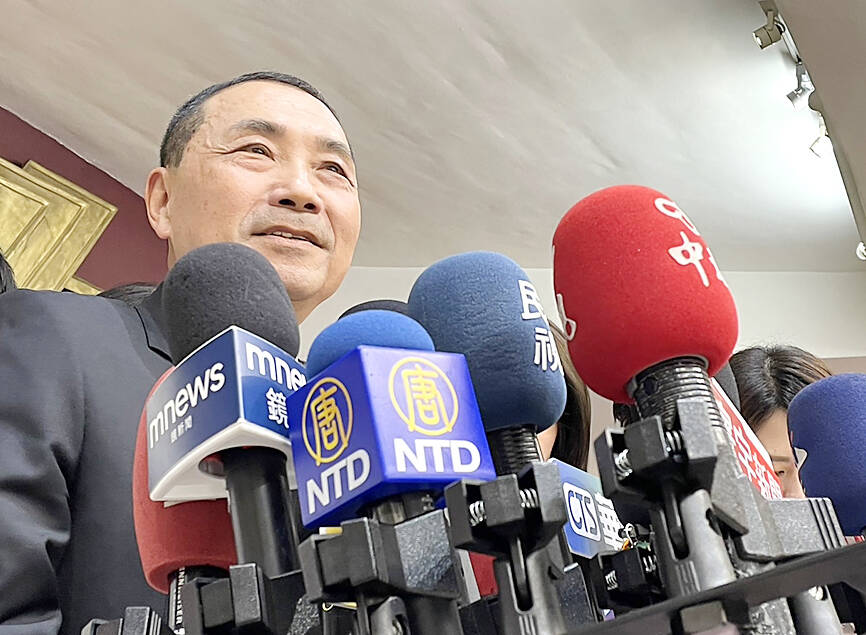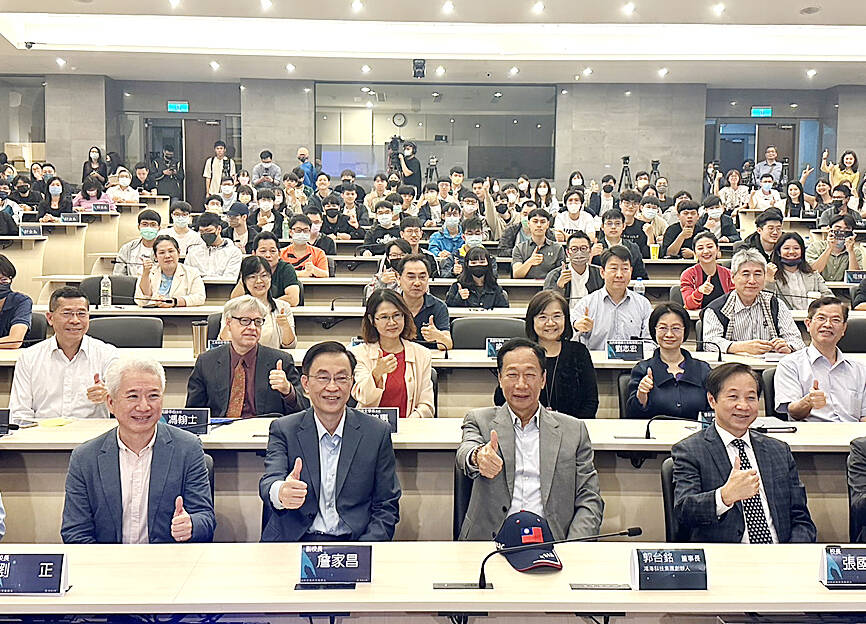Taiwan and the Republic of China (ROC) are mutually dependent entities, New Taipei City Mayor Hou You-yi (侯友宜) said yesterday, using a “water and cup” analogy to describe them.
The strengths of Taiwanese society can be consolidated under the realization that the ROC and Taiwan are inseparably bound and neither can survive without the other, said Hou, who is widely considered to be the frontrunner for the Chinese Nationalist Party’s (KMT) nomination for next year’s presidential election.
Hou used the “water and cup” analogy on the sidelines of a session at the New Taipei City Council a day after he used it in response to KMT Taipei City Councilor Lin Ching-chieh’s (林金結) question about whether China is a friend or foe.

Photo: CNA
“The ROC is a cup and Taiwan is the water in it,” he said on Thursday, adding: “If the cup breaks, the water will spill.”
National security is paramount: Without it, everything would be lost, so the nation must forge a peaceful path that ensures the perpetual existence and prosperity of Taiwan and the ROC, he said.
Taiwan should pursue friendly dialogue with Beijing on the basis of dignity and equality while bolstering national defense, he added.

Photo: CNA
New Power Party (NPP) Chairwoman Claire Wang (王婉諭) yesterday said that Hou’s analogy was an attempt to put Taiwan back into the ROC bottle, which runs counter to the consensus in Taiwan.
Taiwan is gaining recognition and the reality of the nation’s distinct identity from its China is dawning around the world, Wang said.
It is China’s problem that it is angered by the merest show of acceptance of Taiwan by the international community, she said, adding that Hou should condemn Beijing’s outrageous behavior instead of confusing the world with bad analogies.
The NPP supports the sovereignty and independence of Taiwan, and resolutely opposes any scheme that would incorporate it into China, she said, adding that Taiwan must walk its own path under its rightful name.
Meanwhile, Hon Hai Precision Industry Co founder Terry Gou (郭台銘), who has said he would seek the KMT nomination for president, criticized the government’s cross-strait policies and vowed to stop the “harassment” of Taiwan by Chinese warplanes if elected to the top office next year.
He was asked about China after a speech to students at Tunghai University in Taichung.
China is primarily concerned with its economic development, as it faces great pressure to sustain the livelihoods of its people and address the high unemployment among young college graduates, Gou said.
China does not want war, either, “but Taiwan cannot mess around with independence,” he said.
“They think Taiwan belongs to them. Then let them say: ‘We will maintain the status quo’ and keep cross-strait relations in a gray zone,” he said.
While Taiwan is “not the top priority” for China, many politicians in Taiwan try to stoke anti-China sentiment to boost their election campaigns.
Arms purchases by the Democratic Progressive Party (DPP)-led government are bad policy, he said, adding that he would turn Taiwan into a “tech island” not an “ammunition depot.”
Gou said he favored “a dignified peace” and “negotiations between equals.”
If elected president, the “harassment” of Taiwan by Chinese warplanes would stop, because his focus on economic development would bring benefits to China, he said.

Alain Robert, known as the "French Spider-Man," praised Alex Honnold as exceptionally well-prepared after the US climber completed a free solo ascent of Taipei 101 yesterday. Robert said Honnold's ascent of the 508m-tall skyscraper in just more than one-and-a-half hours without using safety ropes or equipment was a remarkable achievement. "This is my life," he said in an interview conducted in French, adding that he liked the feeling of being "on the edge of danger." The 63-year-old Frenchman climbed Taipei 101 using ropes in December 2004, taking about four hours to reach the top. On a one-to-10 scale of difficulty, Robert said Taipei 101

Nipah virus infection is to be officially listed as a category 5 notifiable infectious disease in Taiwan in March, while clinical treatment guidelines are being formulated, the Centers for Disease Control (CDC) said yesterday. With Nipah infections being reported in other countries and considering its relatively high fatality rate, the centers on Jan. 16 announced that it would be listed as a notifiable infectious disease to bolster the nation’s systematic early warning system and increase public awareness, the CDC said. Bangladesh reported four fatal cases last year in separate districts, with three linked to raw date palm sap consumption, CDC Epidemic Intelligence

Taiwanese and US defense groups are collaborating to introduce deployable, semi-autonomous manufacturing systems for drones and components in a boost to the nation’s supply chain resilience. Taiwan’s G-Tech Optroelectronics Corp subsidiary GTOC and the US’ Aerkomm Inc on Friday announced an agreement with fellow US-based Firestorm Lab to adopt the latter’s xCell, a technology featuring 3D printers fitted in 6.1m container units. The systems enable aerial platforms and parts to be produced in high volumes from dispersed nodes capable of rapid redeployment, to minimize the risk of enemy strikes and to meet field requirements, they said. Firestorm chief technology officer Ian Muceus said

MORE FALL: An investigation into one of Xi’s key cronies, part of a broader ‘anti-corruption’ drive, indicates that he might have a deep distrust in the military, an expert said China’s latest military purge underscores systemic risks in its shift from collective leadership to sole rule under Chinese President Xi Jinping (習近平), and could disrupt its chain of command and military capabilities, a national security official said yesterday. If decisionmaking within the Chinese Communist Party has become “irrational” under one-man rule, the Taiwan Strait and the regional situation must be approached with extreme caution, given unforeseen risks, they added. The anonymous official made the remarks as China’s Central Military Commission Vice Chairman Zhang Youxia (張又俠) and Joint Staff Department Chief of Staff Liu Zhenli (劉振立) were reportedly being investigated for suspected “serious